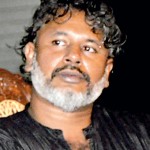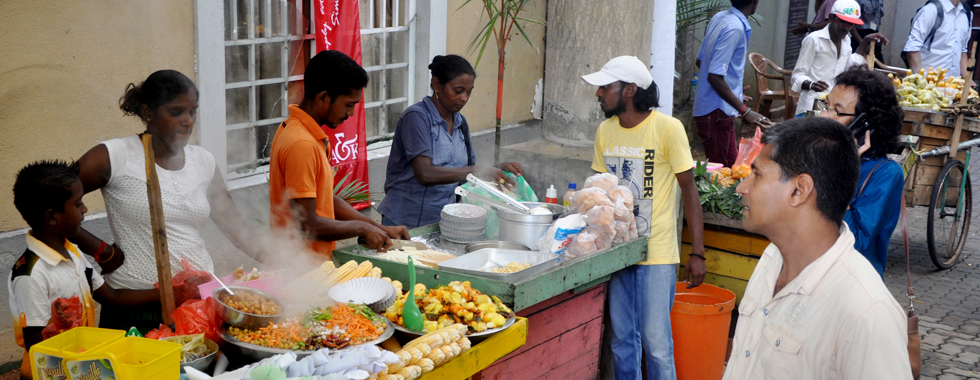First bite provides good taste for wide palate
It was only appropriate that one of the first items visitors encountered when walking into the Annasi and Kadalagotu Lit Fest last Saturday, April 25, were its namesakes. Festival-goers would pause between the day’s sessions to linger at the food carts at the entrance and sample chunks of pineapple and piping hot gram flecked with chilli flakes. Ingredients for the first edition of the A&K Lit Fest included 700 visitors, a bevy of enthusiastic volunteers, a large location, pleasant weather and of course, generous amounts of annasi and kadalagotu.
With parallel sessions spread across multiple locations within the Western Province Aesthetic Resort, the A&K Lit Fest did its best to provide capsule views from varying speakers across wide-ranging topics. While the festival featured familiar names in theEnglish writing circuit, it also endeavoured to include voices from Sinhala and Tamil literature. This is by no means an exhaustive summary of the lit fest, but more to provide a snapshot of some of the festival’s sessions.
A panel discussion on ‘Technological Literature” explored blogging in Sri Lanka as a creative platform, featured strong panelists from varied backgrounds and was well moderated, paving the ground for fertile discussion during the Q&A session. During the discussion, I’m reminded of an essay by Jason Kottke in 2013. One of the oldest bloggers on the global blogosphere, Kottke predicted the death of blogging and its gradual mutation into other forms of social media. While the panel briefly lingered over the creative destruction of the internet, the irreverent nature of blogging and social media, it left me wishing there had been more conversation about this inevitable technological mutation and reincarnation. Technology simultaneously infringes upon and enriches the arts and provides unprecedented democratic expression – how Sri Lanka could leverage on this ebb and flow of technology on a global scale would make for a fascinating conversation.

Ample food to feast on and take in the sessions like Shehan Karunatilaka’s (right). Pix by Nilan Maligaspe
Literary memorabilia is all the rage these days and if Shehan Karunatilaka’s fans at the writer’s session are anything to go by, it’s time for an enterprising marketer to capitalize on the success of his book ‘Chinaman’ and get started on Pradeep Matthew cricket jerseys or W.G. Karunasena branded hipflasks. Titled ‘Insights from a Writer’s Creative Process’, Shehan’s session was a favourite at the fest – a mixture of literary advice and insights into Chinaman’s Sinhala translation along with its translator, Dileepa Abeysekera.
While lit fests attract a throng of people you can be assured of a cast of stock characters–the avid reader, the established writer, the relentless questioner, the earnest journalist and the aspiring writer. And it was the latter who industriously awaited advice during the session, simmering with questions and pen poised over notebook. The trouble however, is that most of the time, the process of writing mulishly defies a formulaic method and differs according to each person. Although bantering that a writer’s tools and setting are key (7B pencils are the literary tool of choice while 9B is used for the really heavy stuff, he announces in a deadpan voice to an amused audience) Shehan deftly boiled down the secret to writing to two simple things: You just read and you write. The perils of procrastination (taking on a side project helps), the myth of the writer’s block (there is no such thing as an engineer’s block; Writing should be no different to any other profession) and the nuances of literary translations were also discussed.
The literary world is quick to laud young literary stars but sometimes, equally quick to overlook the late bloomers at times. Frank McCourt published Angela’s Ashes when he was 66 and Laura Ingalls Wilder was well into her sixties when she wrote the Little House on the Prairie series – proof that literature is not bound to age. The panel discussion focussing on writing in retirement provided insight into how multiple writers forayed into writing later in their lives. It also touched upon the woeful lack of an editing culture in Sri Lanka- good writing after all, can be transformed into great writing under an editor’s discerning eye. There’s an erroneous tendency for writers to blur the distinctions between editing and copy-editing or worse, equate an editor as someone who rips into a novel with all the finesse of a person trying to cut a cake with an axe.
When we meet Captain Elmo Jayawardene, the founder of Annasi and Kadalagotu, the lit fest is drawing to a close. The strains of performance poetry can be heard in the background while an artist smilingly sketches her final customer for the day. The bookstalls are closing down and the publisher’s clinic has administered the last of its literary prescriptions. Backpack slung over his shoulder, Captain Elmo stresses that the Annasi and Kadalagotu fest is for everyone and does not discriminate, hence its affordability and trilingual focus. “Anybody who comes here must come for the love of literature,” he emphasises.
For a first time event, the A&K Lit Fest provided a breath of fresh air to the literary scene. It isn’t easy to build a festival from scratch in a short period of time, and the Annasi and Kadalagotu Lit Fest filled a literary vacuum which existed in Colombo’s arts scene and should be judged on its own merits. For next year’s edition (it is hoped that there will be one next year) it would be nice to see more clear-cut and pertinent topics for discussion. A lot of the panel discussions had vibrant panelists but the open-ended topics left ample room for the conversation to wander away, leaving the moderator scrambling after the remnants of the discussion.
Lit fests provide access to speakers who would otherwise be inaccessible and are important because they ignite critical thinking, conversations and debate and bring together like-minded people. The moment you add a hefty price tag to sessions, you rupture your audience not into those who love literature but those who can afford to love literature, making books and literature a luxury. At 100 rupees for an entire day’s proceedings, it is commendable that the A & K festival went out of its way to be affordable and it is hoped that the 700 people who attended got much more than their money’s worth.


